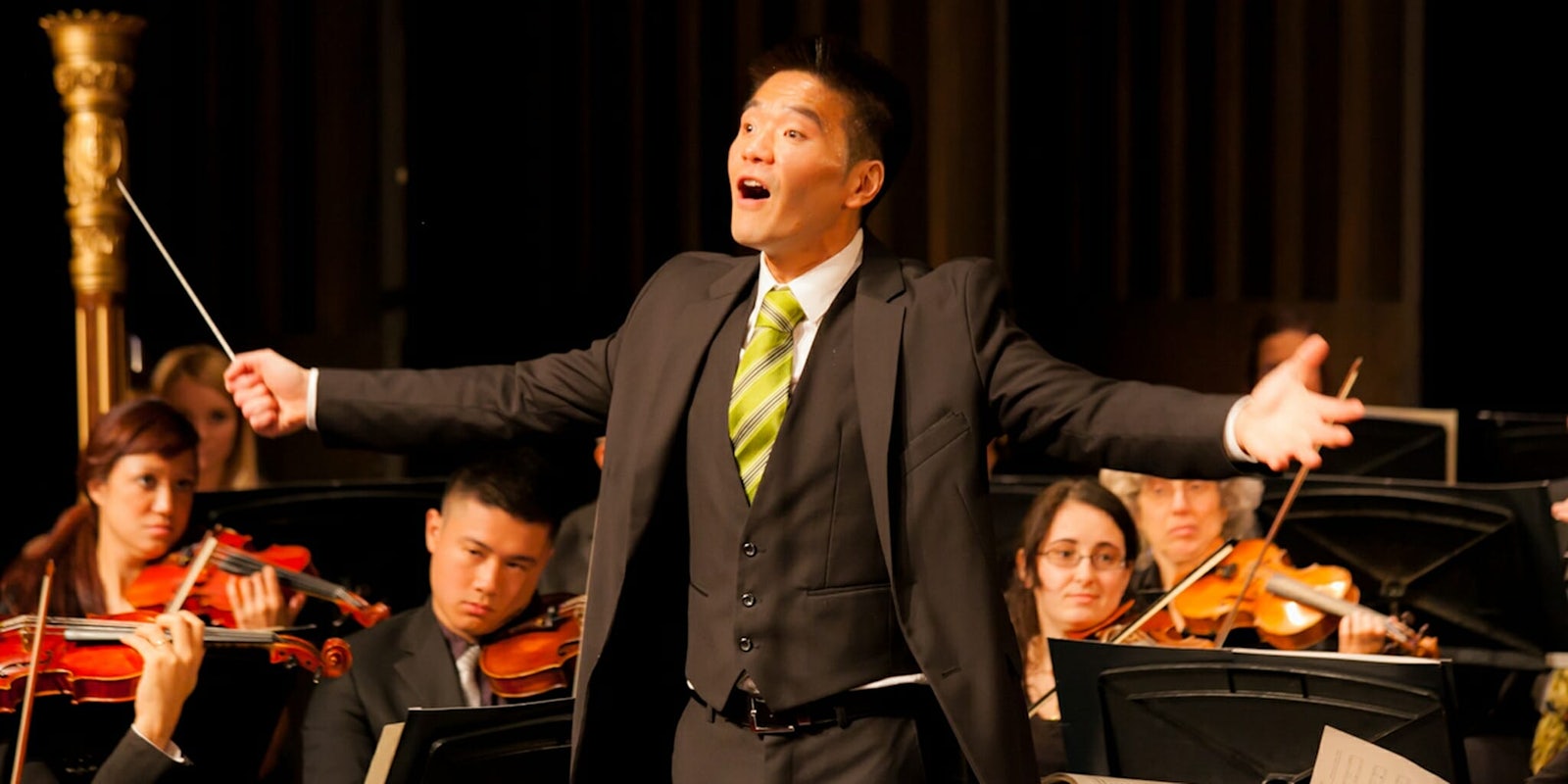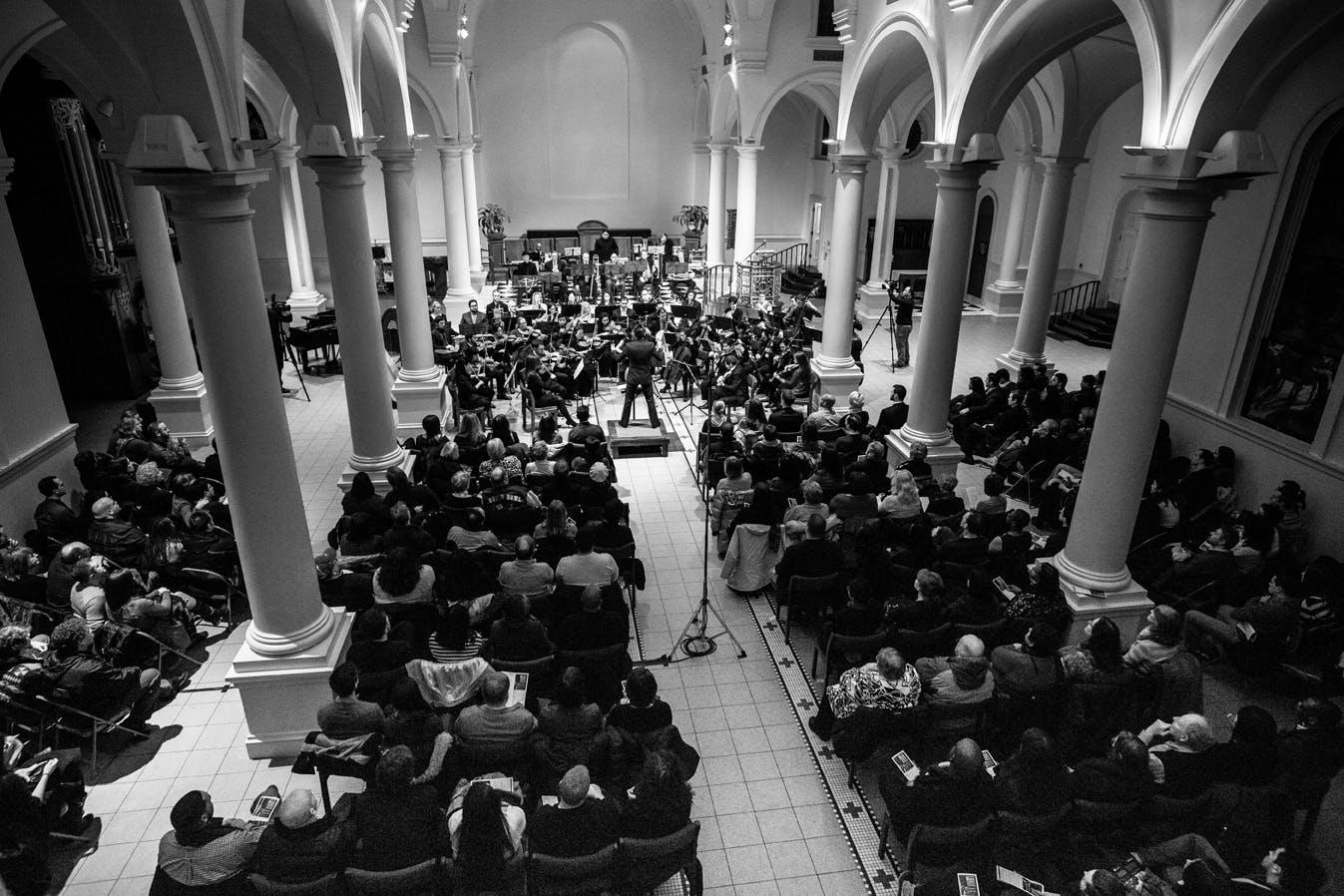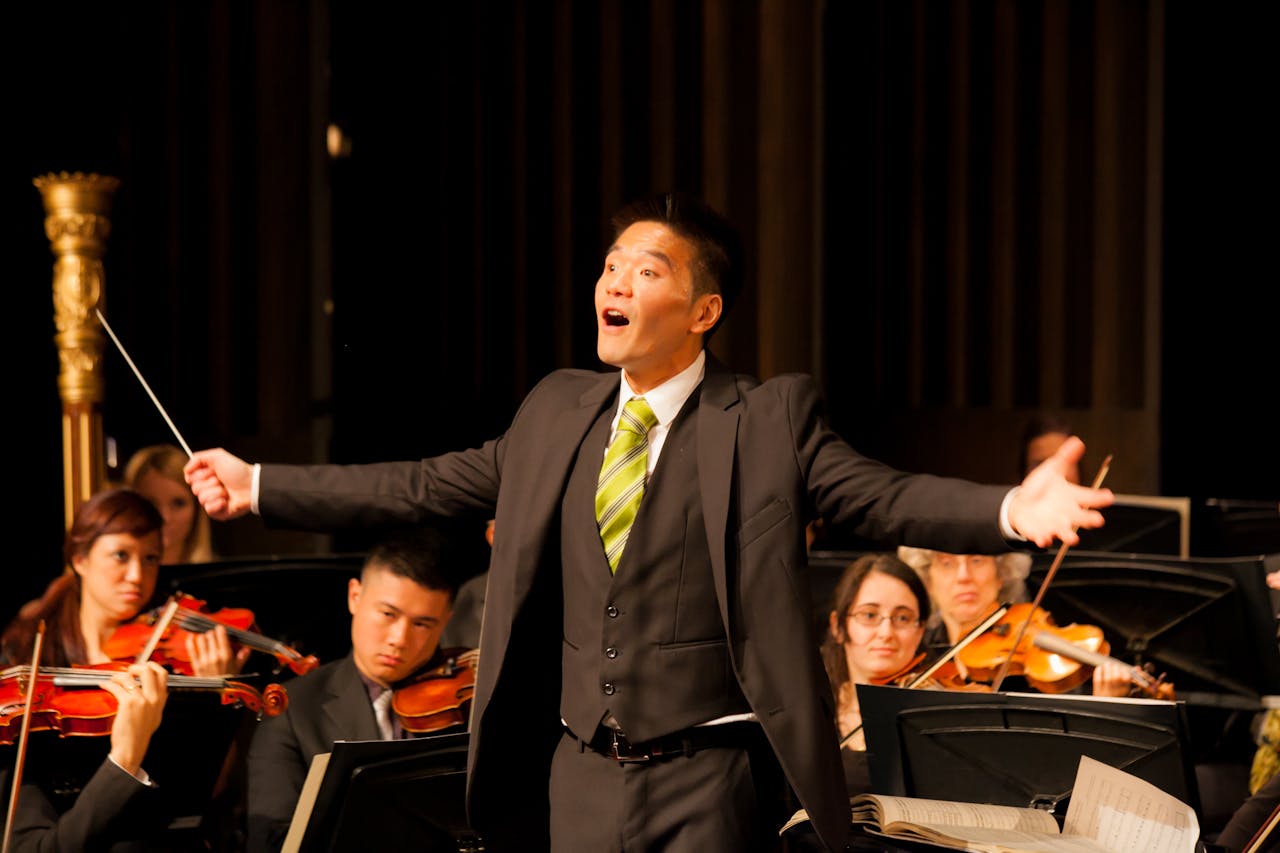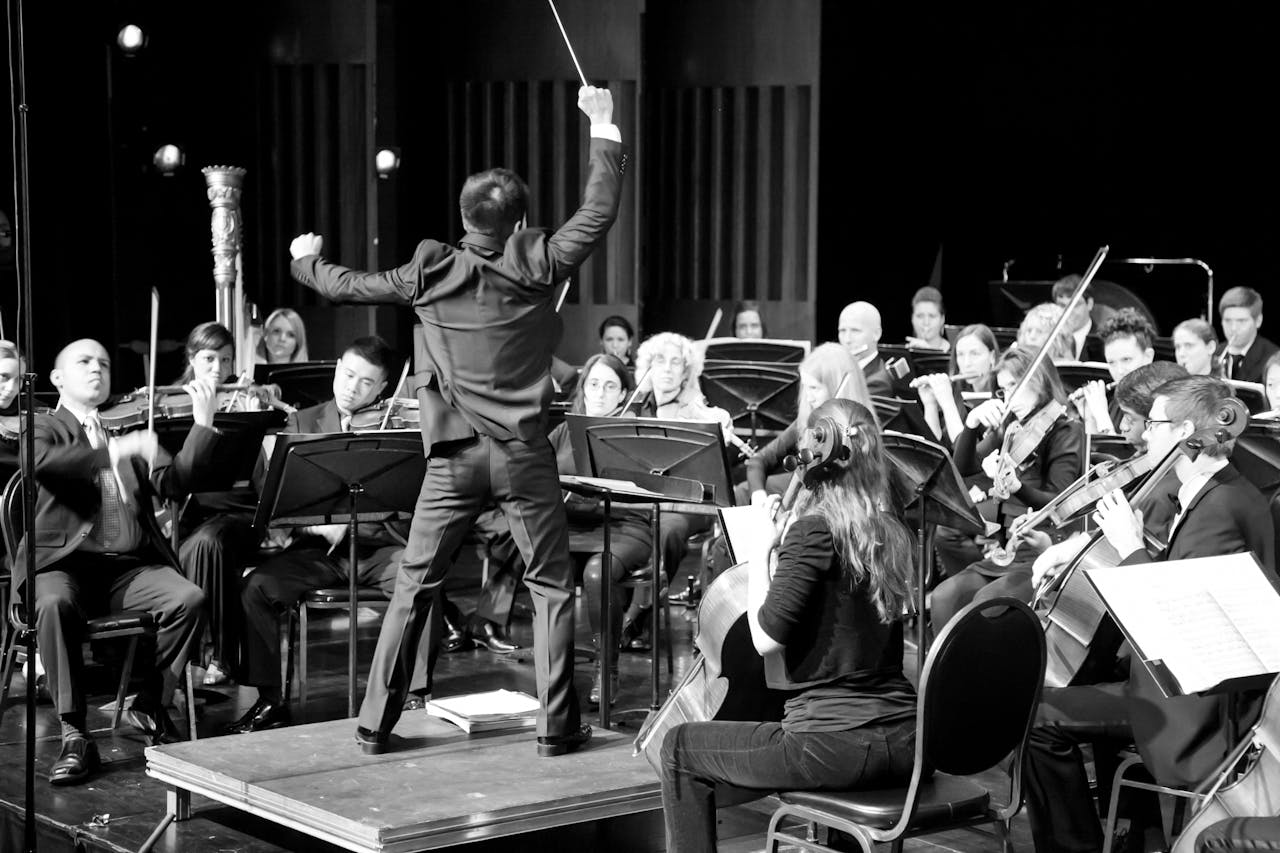Warning: This article contains spoilers for major plot points in Hannibal.
What does a fictional kingdom full of dragons and warring families have in common with a New Mexico meth dealer and a Baltimore serial killer?
Not much—but they all make great opera.
When One World Symphony conductor Sung Jin Hong developed the idea of “operasodes” based on modern pop culture phenomena, he knew he was building on a vast cultural tradition of remixing and adapting works across mediums to reach new audiences.
But after his New York-based symphony premiered operas based on Breaking Bad and Game of Thrones last year, he found himself the subject of major profiles in the Guardian and Esquire. It was clear he’d hit paydirt on an idea that spoke to the community—and to the Internet.
One World has been focusing on community involvement since its formation in 2001, in the wake of Sept. 11. But Hong’s operasodes have helped usher it into a new phase of audience interactivity.
“This cultural movement, which we could call “audience as artist,” has been building for a while,” Hong told the Daily Dot in an email. He’s been hard at work preparing for this month’s premiere of Hannibal: The Opera, debuting for one night only on Oct. 25 in New York City.
Yes, that Hannibal.
How do you tell a story about a serial killer through the medium of a musical drama? For Hong, the key is the intense relationship and psychological development between Bryan Fuller‘s version of Hannibal Lecter and Will Graham. As he does with his other shows, Hong had the cast of Hannibal write “Opening Chords” for their roles. He tells us most of the opera will be structured around duets and the layering of two very different mental journeys for the series’ two protagonists.
Hong made a number of startling musical choices for this opera. Most notably he cast countertenor—a male singer with the range of a female contralto to mezzo-soprano—Nicholas Tamagna as Hannibal, bringing the character’s genderqueer and omnisexual overtones to the forefront. As one of his musical themes, Hong is recreating the “hypnotic” sound effects of heart beats and the sounds of the body. In keeping with its focus on interactivity, the symphony will also be doing a partnership with the Cornell Medical Center to teach audience members effective CPR and other life-saving techniques.
Hong notes mysteriously that the ending currently has “two very contrasting conclusions.” Hmm! We had to find out what sort of thought process went into creating this musical monster—and what other tricks Hong has up Hannibal’s sleeve.
Community outreach has been a major part of your work at One World. Was the decision to begin incorporating pop culture into your performances a part of that community outreach or was it an independent passion of yours?
Hong: This is a wonderful question—cultural anthropology as community engagement. Instead of thinking of “pop culture” as non-elite with socioeconomic connotations, I like to frame it as “the culture of everyday life.” Merely being popular doesn’t make something unsophisticated or not worth examining — that not only surrounds us but infiltrates our lives, and provokes a range of feelings that soothe and stir our emotions. So it’s about passion for us.
“People are no longer willing to passively consume stories. They want to become part of them, to remix and reinvent and send the stories back out into the world.”
We’ve been passionate in incorporating everyday culture since our inception: performing works by numerous living composers (including John Adams’s Doctor Atomic, John Harrison’s The Great Gatsby, Andre Previn’s A Streetcar Named Desire, Kaija Saariaho, Joan Tower, and many more) beside canonical classics that continue to inspire us today, as well as works by U2, Björk, the Beatles, Queen, and One Republic. We love to simply have a great time with our audiences at our Operasode, Halloween, flashmob, and rummage sale concerts, and numerous benefit events that raised funds for local and global causes.
We ask ourselves, “Is performing powerful music enough to resonate and engage with our community?” Moving forward, One World Symphony will continue to increase our dedication into integrating ourselves into the fabric of our community. A great first step is our upcoming and rare collaboration with The Heart Institute of New York Presbyterian Weill Cornell Medical Center at the world premiere of Hannibal (2015). We are grateful and so excited that Hannibal can possibly save lives.
Since One World started doing them, do you think the concept of “operasodes” have caught on outside of your community?
The success of the first Operasode Breaking Bad—Ozymandias (2014) inspired us to embrace the moment—our “culture of everyday life.” We’d like to focus on continuing to understand our guests and audiences. Perhaps we are following Will Graham’s lead in taking perspective. Fortunately, instead of stepping inside the minds of serial killers, we are enjoying the process of audience-centered approach—finding common ground and understanding the world from their perspective.
This cultural movement, which we could call “audience as artist,” has been building for a while. Since so much material is now digital and easy to manipulate, people are no longer willing to passively consume stories. They want to become part of them, to remix and reinvent and send the stories back out into the world, creating something at once new and familiar. This impulse actually isn’t new—it has been part of the great tradition of storytelling going back thousands of years, from Shakespeare to Verdi to Geoffrey of Monmouth to Greek myths told around the evening fires. We may have come up with the Operasode, but taking the stories and characters of today’s myths and adapting them in classic structures is very much a facet of the modern zeitgeist.
You’ve done classical interpretations of Game of Thrones, Breaking Bad, and now Hannibal, which are all shows that have their own intense relationship to music. (For instance, the finale of Breaking Bad being based closely on the song “El Paso,” and Hannibal’s use of the Fauré Requiem and Bach, along with other notable classical pieces that recur throughout.) Does that influence how you create your own operas in turn? Or do you just focus on the story?
Most of my compositions have been influenced by personal experiences and modern narratives. Similar to thousands of years ago when Greek plays sparked dialogue and criticism, television has become a major storyteller reflecting contemporary culture. The most arresting moments in Fuller’s Hannibal may have been intense psychological scenes between two people. In my music drama, most of the vocal scenes are duets, intimately exploring the mental states of the protagonists. These one-on-one scenes heavily emphasize not only the narrative arc but the characters who develop over time, creating layers of depth in their eventual metamorphosis.
Both music directors of Breaking Bad and Hannibal played vital roles in enhancing their respective narratives. The incorporation of “El Paso” was the icing on the cake for those who craved a finale wrapped with a perfect bow. This opens the question of why it’s challenging to commit to a conclusion of a novel or a large-scale work of any kind. Like many writers, I wrestle with the balance of leaving a little to the audience’s imagination while deciding on a compelling conclusion. Similar to Breaking Bad—Ozymandias, the music drama Hannibal has two very contrasting conclusions at this time.
It’s an immense honor for any composer to be in the same lineup with Johann Sebastian Bach, Gabriel Fauré, and Igor Stravinsky. You have no choice but to appreciate the moment and learn from the best. Bach’s Goldberg Variations has been my daily bread that not only continues to fuel my morning routine, but feed my soul. Fauré’s sublime Requiem teaches me to “do simple better.” Stravinsky’s The Rite of Spring with its imaginative harmonies and pulverizing rhythms still shakes me to the core.
There’s so much rich imagery in Hannibal, and I know you’ve thought about how to incorporate heartbeats and blood and the sounds of the body. Can you talk a little about whether we’ll hear leitmotifs that represent things like the Ravenstag, the wendigo, the Botticelli, Blake’s red dragon, Hannibal’s “mind palace,” etc?
The lush and soaring themes that represent the Ravenstag, the wendigo, and Hannibal’s mind palace will be depicted by one of the most under-appreciated protagonist[s] in music dramas: the symphony. Similar to a Greek Chorus, the entire symphony will be leading the expansive narrative, commenting on the intense situations and traumas, and magnifying the psychological underpinnings—with all the turbulent and irregular heart rhythms and murmurs. I hope these depictions will be both hypnotic and a luxuriant experience for our guests at the premiere.
One of the more poignant moments will be the intimate treatment of William Blake’s Songs of Innocence and of Experience from Thomas Harris’s novel Red Dragon. The scene will simultaneously juxtapose the use of circle of fifths and circle of tritones (“the Devil in music”) creating tension between protected innocence and corrupted experience.
There’s a lot that Bryan Fuller and Mads Mikkelsen did to humanize and bring nuance to Hannibal Lecter’s persona, but when he’s singing he’s going to be even more deeply empathic and immediately relatable to an audience. Is that scary, or is it freeing, or both? Especially since you’ve chosen to cast a countertenor—what does that casting choice do to our preconceived notions of how that character functions and who they are? Can Hannibal be genderqueer, for example, and still exert the same emotional impact on the audience?
In Fuller’s drama, Lecter was not just an omnisexual, but he was beyond an enigma, a contradiction. What vocal fach [a vocalist’s musical range and tone quality] would best represent something not binary but along the spectrum of Hannibal, possessing both monstrous and humanistic qualities? Would casting a countertenor for the title role queer the character’s gender, sexuality, and frankly entire identity?
Hannibal presents as a man, but sings in a “feminine” vocal spectrum—or is he a woman hidden in the body of a man? Is he a man who desires women, a woman in the body of a man who desires men, a gender-fluid person who desires men and women, or something else entirely?
There’s tension for the audience in believing Hannibal to be one neat thing, to be seduced into a vision of the character’s identity, and then to have these multiple and contradictory facets revealed—to truly get to “see him” and “know him.” I believe this interpretation will have more emotional impact than a straightforward, “Oh, he was bisexual all along.”
A sensitive countertenor allows a delicate union of male and female, of the terror and the sublime, which both exist in the character. I’m confident that our audience will be mesmerized by the elegant and supernatural vocal qualities from our countertenor performing the title role, Nicholas Tamagna.
You’ve said you want to focus on things like empathy and questions of morality, which has to be difficult in such a short space. Can you talk about which characters and parts of the narrative we’ll be focusing on? (I’d sign up for a full hour of just being in Will Graham’s head, honestly!)
Obviously, the music drama will focus on the two Hannibals and Will. In Thomas Harris’s novels Red Dragon and Silence of the Lambs, Lecter may have been behind the scenes, but was omnipresent. In Fuller’s drama, what or who sparked the brooding relationship between Will and Hannibal? It would have been a safe choice to compose an operatic Mad Scene for Will Graham. This rapturous moment will be given to the unassuming character Abigail Hobbs—exploring her hysteria and female empowerment. Does she remind you of Pearl who brought the forbidden lovers together at the stake in Nathaniel Hawthorne’s magnum opus Scarlet Letter? Abigail’s complex role in Fuller’s drama planted the seeds for Lecter and Will’s desire to “become” a family. I’m looking forward to how our world premiere guests will respond to Abigail’s Mad Scene, which will be performed by the fiery soprano Marie Putko and the symphony.
Would you sign up for a a full hour of just being in Abigail Hobbs’s head instead?
What was it like trying to compose around the intense dynamic that Hannibal and Will share? Did you find yourself writing themes for the two of them as an entity, or creating separate musical themes for the two of them that conflicted or clashed? I’d also imagine Will’s musical themes were incredibly unstable.
It was a great joy to compose around the intense dynamic between Hannibal and Will. There are unique themes for each protagonist in the music drama, as well as themes as an entity that will remain cryptic until Hannibal reveals himself to Will—à la “The Red Dinner.”
In Will’s moment of pure empathy, adapted from the shocking episode when Beverly Katz is sliced, the tonal center is ambiguous. [In his Opening Chord,] Tenor Ransom Bruce, who plays the FBI profiler, described the music as:
“By layering chord over chord to create dissonances that find their way to resonance, the score reflects how terror and tenderness are interwoven in the characters.”
The layering of polychords will blur and suspend the sense of tonal and moral center for Will.
(Ransom has truly adapted method acting in playing the empathic FBI profiler, as he has caught some notational discrepancies between my original manuscript and the printed score.)
Can you talk about any interactive moments that will be on the menu for the audience at the performance?
Breaking Bad—Ozymandias had the “Bitch Aria” for our passionate audiences. Perhaps, there will be a “FACH-Aria” in Hannibal (2015)?
Finally, can you share any insight about how you’ll be incorporating Hannibal’s love of food into the piece?
If music be the food of love, play on!
Photo by Iconography by Eric and Christopher courtesy of One World Symphony





